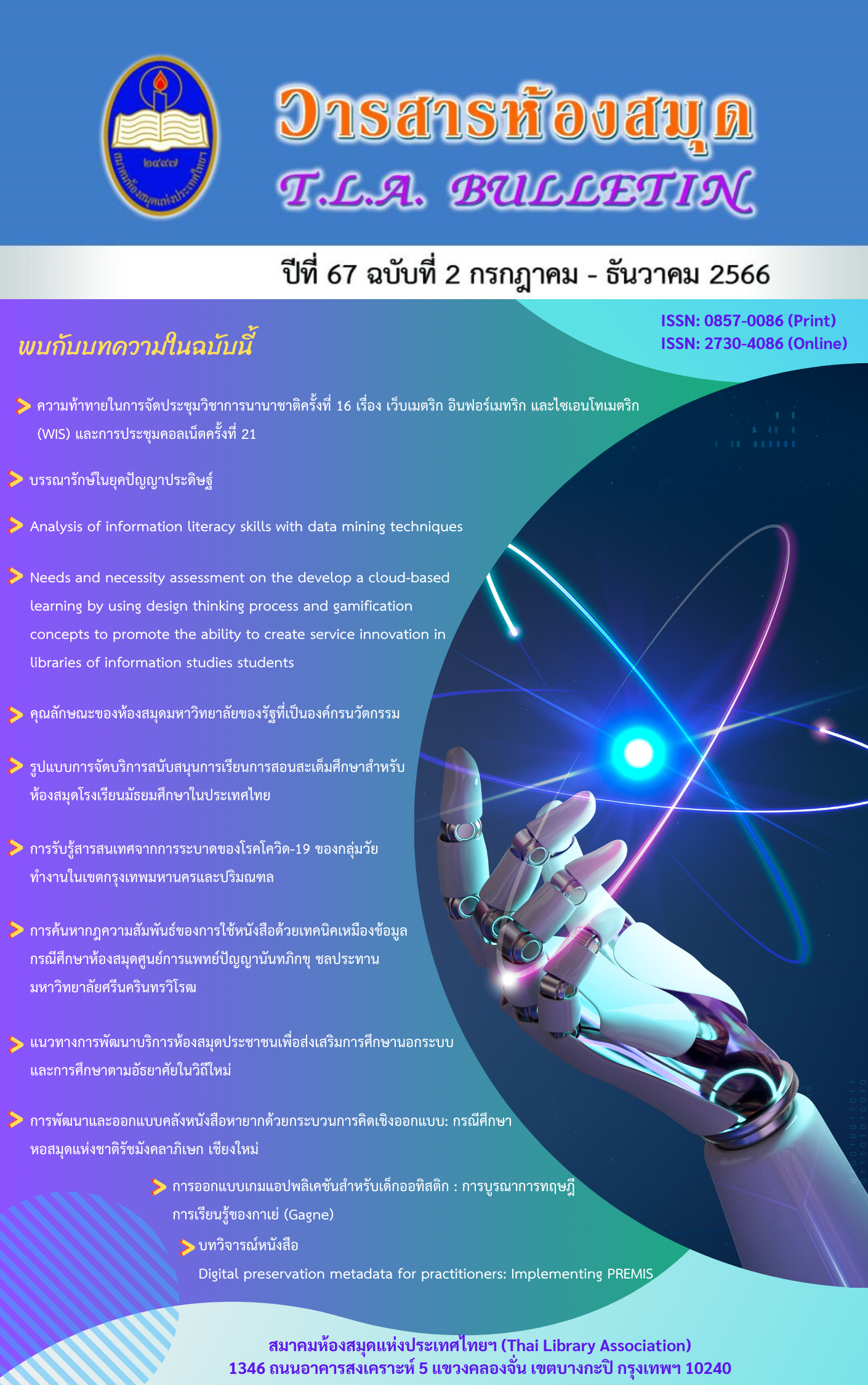การออกแบบเกมแอปพลิเคชันสำหรับเด็กออทิสติก: การบูรณาการทฤษฎีการเรียนรู้ของกาเย่ Gagne
คำสำคัญ:
การออกแบบเกมแอปพลิเคชัน, ออทิสติก, ทฤษฎีการเรียนรู้ของกาเย่บทคัดย่อ
การวิจัยนี้เป็นการนำทฤษฎีการเรียนรู้ของกาเย่ ซึ่งเป็นทฤษฎีการเรียนรู้ที่ช่วยในการออกแบบเกมแอปพลิเคชัน เพื่อสร้างแรงจูงใจ สร้างแรงกระตุ้น ก่อให้เกิดการเรียนรู้บนสื่อ โดยเกมแอปพลิเคชันสามารถมอบประสบการณ์การเรียนรู้ที่สามารถตอบสนองความต้องการเฉพาะและรูปแบบการเรียนรู้ของเด็กออทิสติก การวิจัยนี้เป็นเชิงคุณภาพ ด้วยการสัมภาษณ์และการสังเกตเพื่อรวบรวมข้อมูลเชิงลึกเกี่ยวกับประสบการณ์ผู้ใช้ นักเทคโนโลยีการศึกษา ผู้เชี่ยวชาญด้านเด็กออทิสติก นักออกแบบและพัฒนาโปรแกรม ผลลัพธ์งานวิจัยนี้ได้ความรู้เกี่ยวกับหลักการออกแบบเกม ตัวละคร ฉาก และคุณลักษณะที่เพิ่มประสิทธิภาพการมีส่วนร่วมและการเรียนรู้สำหรับการพัฒนาสื่อการเรียนรู้สำหรับเด็กออทิสติก อีกทั้งการออกแบบและพัฒนาเกมนี้ยังมอบประสบการณ์การเรียนรู้แบบโต้ตอบและมีส่วนร่วมที่ส่งเสริมการพัฒนาความรู้ความเข้าใจ สังคม และอารมณ์ ด้วยการออกแบบที่คำนึงถึงความต้องการเฉพาะของผู้เรียน จึงสามารถส่งเสริมเด็กออทิสติกให้เกิดการเรียนรู้และเจริญเติบโตในสภาพแวดล้อมที่สนุกสนานได้
Downloads
เอกสารอ้างอิง
Al-Qassabi, H., and Al-Samarraie, H. (2013). Applying Gagne’s nine events in the design of an Interactive eBook to learn 3D animation. Advances in Computing, 3(3), 60-72. http://article.sapub.org/10.5923.j.ac.20130303.05.html
Anzulewicz, A., Sobota, K., and Delafield-Butt, J. T. (2016). Toward the Autism Motor Signature: Gesture patterns during smart tablet gameplay identify children with autism. Scientific Reports, 6(1), 31107. https://doi.org/10.1038/srep31107
Constantin, A., Johnson, H., Smith, E., Lengyel, D., and Brosnan, M. (2017). Designing computer-based rewards with and for children with Autism Spectrum Disorder and/or Intellectual Disability. Computers in Human Behavior, 75, 404-414. https://doi.org/https://doi.org/10.1016/j.chb.2017.05.030
Franklin, A., Sowden, P., Burley, R., Notman, L., and Alder, E. (2008). Color Perception in Children with Autism. Journal of Autism and Developmental Disorders, 38(10), 1837-1847. https://doi.org/10.1007/s10803-008-0574-6
Gagné R, M. (1985). The Conditions of Learning and Theory of Instruction. Nashville: Southwestern Publishing Group.
Lussier-Desrochers, D., Massé, L., Simonato, I., Lachapelle, Y., Godin-Tremblay, V., and Lemieux, A. (2023). Evaluation of the Effect of a Serious Game on the Performance of Daily Routines by Autistic and ADHD Children. Advances in Neurodevelopmental Disorders, 7(4), 566-578. https://doi.org/10.1007/s41252-023-00319-4
Malinverni, L., Mora-Guiard, J., Padillo, V., Valero, L., Hervás, A., and Pares, N. (2017). An inclusive design approach for developing video games for children with Autism Spectrum Disorder. Computers in Human Behavior, 71, 535-549. https://doi.org/https://doi.org/10.1016/j.chb.2016.01.018
Miner, A., Mallow, J., Theeke, L., and Barnes, E. (2015). Using Gagne’s 9 Events of Instruction to Enhance Student Performance and Course Evaluations in Undergraduate Nursing Course. Nurse Educator, 40(3), 152-154. https://doi.org/10.1097/nne.0000000000000138
Mohd, C. K. N. C. K.; Shahbodin, F.; Sedek, M. and Samsudin, M. (2020). Game Based Learning for Autism in Learning Mathematics. International Journal of Advanced Science and Technology, 29(5).
Mohd, C., Shahbodin, F., Sedek, M., and Samsudin, M. (2020). Game based learning for autism in learning mathematics. International Journal of Advanced Science and Technology, 29(5), 4684-4691.
Ozdemir, S. (2008). Using multimedia social stories to increase appropriate social engagement in young children with autism. Turkish Online Journal of Educational Technology-TOJET, 7(3), 80-88.
Simeoli, R., Milano, N., Rega, A., and Marocco, D. (2021). Using Technology to Identify Children With Autism Through Motor Abnormalities [Original Research]. Frontiers in Psychology, 12. https://doi.org/10.3389/fpsyg.2021.635696
Spiel, K., Frauenberger, C., Keyes, O., and Fitzpatrick, G. (2019). Agency of autistic children in technology research-A critical literature review. ACM Transactions on Computer-Human Interaction (TOCHI), 26(6), 1-40.
Vallefuoco, E.; Bravaccio, C. and Pepino, A. (2017). Serious Games in Autism Spectrum Disorder An example of personalised design. Special Session on Serious Games on Computer Science Learning, the International Conference on Computer Supported Education.
ดาวน์โหลด
เผยแพร่แล้ว
รูปแบบการอ้างอิง
ฉบับ
ประเภทบทความ
สัญญาอนุญาต
ลิขสิทธิ์ (c) 2023 วารสารห้องสมุด สมาคมห้องสมุดแห่งประเทศไทยฯ

อนุญาตภายใต้เงื่อนไข Creative Commons Attribution-NonCommercial-NoDerivatives 4.0 International License.




